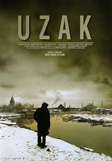
|
|
Distant
Thunder : Uzak
Liam Lacey, Cinema Scope, Summer 2003
Roger Ebert, joining the chorus
of dismay over the Cannes line-up, placed the Turkish entry Uzak in the
category of “fashionably dead” films from such directors as Theo Angelopoulos
and Abbas Kiarostami, in which “grim middle-aged men with mustaches sit
and look and think and smoke and think and look and sit and smoke and
shout and drive around and smoke until finally there is a closing shot
that lasts forever and has no point.” Caricature needn’t be accurate,
but the attack is worth considering, if only to note the company in which
Nuri Bilge Ceylan is placed. Obviously, Ebert’s derision is far from universal:
Uzak won the Grand Prize, and the best actor awards for Muzaffer Ozdemir
(as Mahmut) and the late Mehmet Emin Toprak (as Yusuf), who died in a
car accident a day after the film was accepted at Cannes; it belatedly
ended up among the few critical hits of the festival.
Ceylan, who wrote, shot, directed, edited, and produced his film, says
his film was about “nothing”, or “the meaninglessness of life.” More specifically,
Uzak – the English title is translated as Distant – is, in the words of
the late George Harrison, “about the space between us all.” The subject
is also the distance a man feels toward the events unfolding in his own
life. Rather than some fashionable trend in ennui, Uzak is in the tradition
of Joyce’s urban paralysis, Eliot’s wasteland, the cruel vaudeville of
Waiting for Godot and, perhaps most importantly, the pained silences and
the expressionist, desiccated landscape of Antonioni. And rather than
copycat minimalism, Ceylan finds a fresh take on an old sorrow. This is
the director’s fourth film, with the previous three, including the festival
hit Clouds of May (2000), all set in rural backgrounds. Uzak begins with
Yusuf leaving his village after the local factory has closed, but the
rest of the film is distinctly urban. Mahmut is a modern man, with a flat-screen
television, media job, and empty sexual encounters.
Using an amateur cast – his best friend, his wife, his mother, and his
cousin – Ceylan shows himself a director of impeccable patience, who discovers
moments rather than designs them. Istanbul is any modern city, with its
bars, record stores, and staring strangers. While his characters watch
and spy on each other, Ceylan’s camera merely waits, watches, and almost
becomes invisible: it peers down an empty corridor until a character appears;
it shoots from a doorway, past the slumped shoulders of unemployed labourers
in a downtown bar. The film uses no music score, with the weather and
sounds (barking dogs, crunching boots on the snow) communicating his characters’
inner lives. Throughout, Ceylan cleaves to the experience of what Henry
James called “felt life,” with discipline, discretion, and insight.
In a year when Cannes featured a variety of totemic animals, Uzak was
represented by a humble, unwanted mouse. The story is a variation on the
children’s parable of the country mouse and his richer city cousin. Mahmut
is a photographer, primarily for a tile factory, though his walls reveal
he has probably seen more artistically satisfying days. He talks to his
ill mother on the phone, channel-surfs, and watches porn tapes. His divorced
wife, sterile from an abortion, is about to emigrate to Canada with her
new husband. In the opening scene, we see Mahmut in the detached aftermath
of a sexual encounter with a woman who occasionally visits. Soon after,
Yusuf arrives at his apartment. Unemployed, Yusuf has hopes of taking
a job on a ship, but discovers all doors are closed. Mahmut rapidly becomes
impatient with his cousin, and Yusuf, pretending to wait for potential
employers, spends his days on the streets, in cafés and bars, or following
a neghbourhood woman whom he is too shy to approach.
One night, the mouse Mahmut has been trying desperately to catch finally
gets stuck in its trap, and screams piteously. Mahmut orders Yusuf to
take it to the garbage, where prowling cats are waiting to feed. In an
act of pity, he dashes its brains out on a wall. No such relief is offered
for Yusuf, who, after being berated and humiliated by Mahmut – including
a fine capitalist speech about pulling yourself up by your bootstraps
– disappears as quietly as he arrived, leaving only a crumpled cigarette
pack. Mahmut, who has raced to the airport to watch from behind a column
as his wife departs, now sits seated on a park bench, resigned and expressionless,
under a dark sky, while the sea swells and rolls, a palpable image of
raging emptiness. Take this as a recognition of the inevitability of petty
cruelties and selfishness, or an indictment of the same, but the point
of the exercise is not of closure, but brief clarity. Like those “fashionable”
directors, Ceylan is almost classical in his old-fashionedness: he seeks
to drag from life’s war of attrition a glimpse of order, perhaps even
a catharsis, but nothing as simple as consolation.
|

